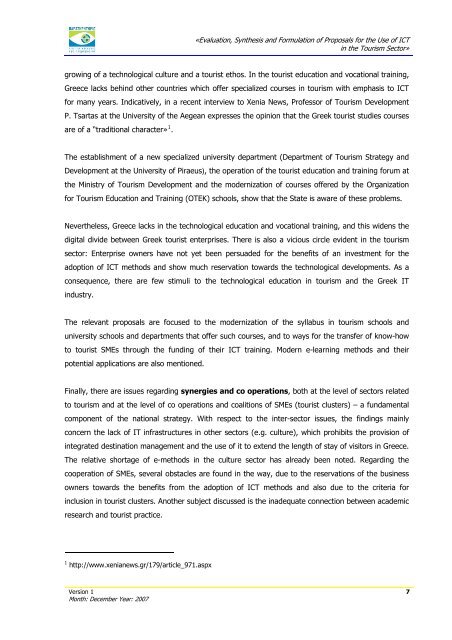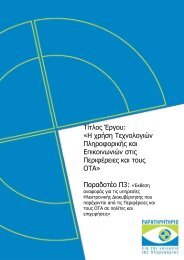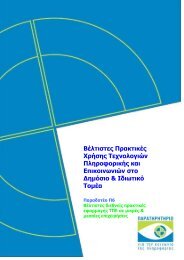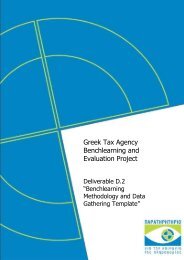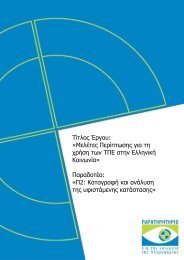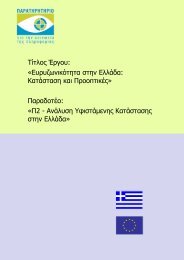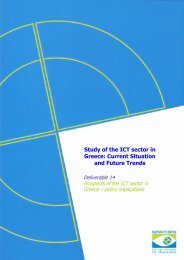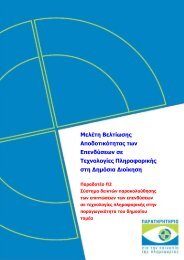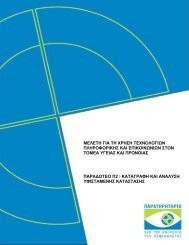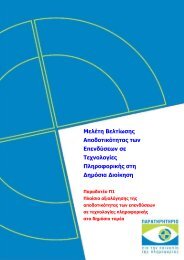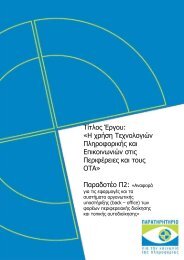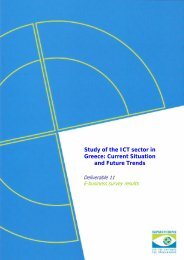Evaluation, Synthesis and Formulation of Proposals for the Use of ...
Evaluation, Synthesis and Formulation of Proposals for the Use of ...
Evaluation, Synthesis and Formulation of Proposals for the Use of ...
You also want an ePaper? Increase the reach of your titles
YUMPU automatically turns print PDFs into web optimized ePapers that Google loves.
«<strong>Evaluation</strong>, <strong>Syn<strong>the</strong>sis</strong> <strong>and</strong> <strong>Formulation</strong> <strong>of</strong> <strong>Proposals</strong> <strong>for</strong> <strong>the</strong> <strong>Use</strong> <strong>of</strong> ICTin <strong>the</strong> Tourism Sector»growing <strong>of</strong> a technological culture <strong>and</strong> a tourist ethos. In <strong>the</strong> tourist education <strong>and</strong> vocational training,Greece lacks behind o<strong>the</strong>r countries which <strong>of</strong>fer specialized courses in tourism with emphasis to ICT<strong>for</strong> many years. Indicatively, in a recent interview to Xenia News, Pr<strong>of</strong>essor <strong>of</strong> Tourism DevelopmentP. Tsartas at <strong>the</strong> University <strong>of</strong> <strong>the</strong> Aegean expresses <strong>the</strong> opinion that <strong>the</strong> Greek tourist studies coursesare <strong>of</strong> a “traditional character» 1 .The establishment <strong>of</strong> a new specialized university department (Department <strong>of</strong> Tourism Strategy <strong>and</strong>Development at <strong>the</strong> University <strong>of</strong> Piraeus), <strong>the</strong> operation <strong>of</strong> <strong>the</strong> tourist education <strong>and</strong> training <strong>for</strong>um at<strong>the</strong> Ministry <strong>of</strong> Tourism Development <strong>and</strong> <strong>the</strong> modernization <strong>of</strong> courses <strong>of</strong>fered by <strong>the</strong> Organization<strong>for</strong> Tourism Education <strong>and</strong> Training (OTEK) schools, show that <strong>the</strong> State is aware <strong>of</strong> <strong>the</strong>se problems.Never<strong>the</strong>less, Greece lacks in <strong>the</strong> technological education <strong>and</strong> vocational training, <strong>and</strong> this widens <strong>the</strong>digital divide between Greek tourist enterprises. There is also a vicious circle evident in <strong>the</strong> tourismsector: Enterprise owners have not yet been persuaded <strong>for</strong> <strong>the</strong> benefits <strong>of</strong> an investment <strong>for</strong> <strong>the</strong>adoption <strong>of</strong> ICT methods <strong>and</strong> show much reservation towards <strong>the</strong> technological developments. As aconsequence, <strong>the</strong>re are few stimuli to <strong>the</strong> technological education in tourism <strong>and</strong> <strong>the</strong> Greek ITindustry.The relevant proposals are focused to <strong>the</strong> modernization <strong>of</strong> <strong>the</strong> syllabus in tourism schools <strong>and</strong>university schools <strong>and</strong> departments that <strong>of</strong>fer such courses, <strong>and</strong> to ways <strong>for</strong> <strong>the</strong> transfer <strong>of</strong> know-howto tourist SMEs through <strong>the</strong> funding <strong>of</strong> <strong>the</strong>ir ICT training. Modern e-learning methods <strong>and</strong> <strong>the</strong>irpotential applications are also mentioned.Finally, <strong>the</strong>re are issues regarding synergies <strong>and</strong> co operations, both at <strong>the</strong> level <strong>of</strong> sectors relatedto tourism <strong>and</strong> at <strong>the</strong> level <strong>of</strong> co operations <strong>and</strong> coalitions <strong>of</strong> SMEs (tourist clusters) – a fundamentalcomponent <strong>of</strong> <strong>the</strong> national strategy. With respect to <strong>the</strong> inter-sector issues, <strong>the</strong> findings mainlyconcern <strong>the</strong> lack <strong>of</strong> IT infrastructures in o<strong>the</strong>r sectors (e.g. culture), which prohibits <strong>the</strong> provision <strong>of</strong>integrated destination management <strong>and</strong> <strong>the</strong> use <strong>of</strong> it to extend <strong>the</strong> length <strong>of</strong> stay <strong>of</strong> visitors in Greece.The relative shortage <strong>of</strong> e-methods in <strong>the</strong> culture sector has already been noted. Regarding <strong>the</strong>cooperation <strong>of</strong> SMEs, several obstacles are found in <strong>the</strong> way, due to <strong>the</strong> reservations <strong>of</strong> <strong>the</strong> businessowners towards <strong>the</strong> benefits from <strong>the</strong> adoption <strong>of</strong> ICT methods <strong>and</strong> also due to <strong>the</strong> criteria <strong>for</strong>inclusion in tourist clusters. Ano<strong>the</strong>r subject discussed is <strong>the</strong> inadequate connection between academicresearch <strong>and</strong> tourist practice.1 http://www.xenianews.gr/179/article_971.aspxVersion 1Month: December Year: 20077


